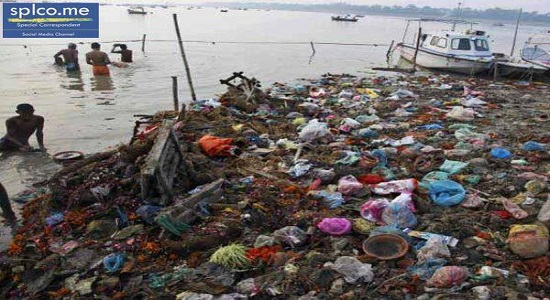National Green Tribunal (NGT) again on Friday imposed a ban on plastic items, including plastic bags and cutlery, in Haridwar and Rishikesh.

Further, the bench headed by NGT chairperson Swatanter Kumar banned the sale, manufacture and storage of all such plastic items, till Uttarkashi. The green panel specified that the ban would be applicable to towns in Uttarakhand, along river Ganga and its tributaries.
The Tribunal said a fine of ₹5,000 would be imposed on those violating the order. Action would be taken against erring officials as well.
In a judgment passed in 2015, the NGT had observed : “Plastic waste and other municipal waste is being thrown directly into river Ganga and its banks are full of such waste. There is no proper system for collection, segregation and disposal of municipal solid waste in the entire city of Haridwar.” said: In a bid to check further pollution of the river, the green panel had imposed a ban on the use of plastic. “There shall be complete prohibition of use of plastic in the entire city of Haridwar and Rishikesh and particularly on the banks and flood plain of river Ganga. Plastic will not be used for any purpose whatsoever, that is serving food, commodities, packaging or even carrying the plastic in that area.” the bench had said.
As part of the project to clean the river, the bench had held, “Under no circumstances, plastic carry bags of any thickness whatsoever would be permitted. The procurement, storing and sale of such plastic bags, plates, glass, spoons are hereby prohibited.”
Further, the Tribunal had also prohibited the authorities from throwing municipal waste, construction and demolition waste into Ganga and its tributaries.
The green panel passed the directions while hearing a plea filed by environmentalist M.C. Mehta, and observed that despite previous orders passed by the Tribunal, plastic was still being used, which in turn was polluting the river.
Former Prime Minister Manmohan Singh was the head of the National Ganga River Basin Authority (NRBA), a regulatory body formed in February 2009 with an objective to reduce pollution and to conserve the Ganga. But he along with two more members resigned from the post because of lack of accountability and commitment. NRBA had been granted fund of Rs 3,031 to operate 56 schemes in 44 towns. As per available data Rs 785 crore had already been spent till September 2013. NRBA was supported by the National Ganga River Basin Project.
Closure and relocation of industrial plants along the Ganges is tackled by the Supreme Court of India. Stretch of the river between Gaumukh and Uttarkashi has been termed as ‘eco-sensitive zone’ in 2010.
In his first year 2015, Modi launched the Namami Gange programme with a whopping budget of 20,000 crore for a five-year period ending 2020.
This was at least 20 times more than what had been spent on Ganga rejuvenation projects since 1985.
However, as his government nears the three-year mark, An RTI reply from the PMO last year revealed that about 20% of the Rs 3,700-crore funds allocated in the first two years of the programme was not utilised.
The committee formed by Bharti is part of the latest in a series of steps taken at the central level to reinvigorate the programme.














